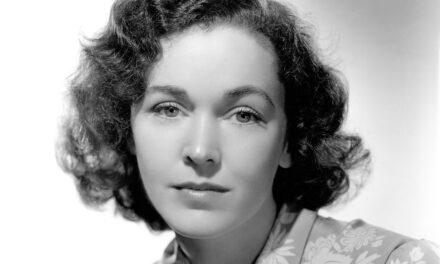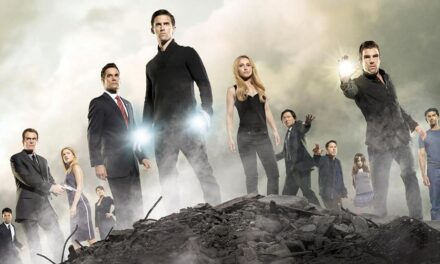A few years ago a colleague suggested that I watch an unusual television programme about people watching television programmes. Obviously, such a description didn’t initially tempt me to spend my valuable leisure time observing a bunch of boring strangers make silly comments about this week’s programmes. I’m more than capable of doing this myself. When my curiosity was eventually roused enough to figure out what- in this seemingly ridiculous format called Gogglebox (Channel 4, 2013- ) – had caught the public’s imagination, I found I had to change my tune and rethink my elitist attitude. The participants on Gogglebox were, simply put, nice. Equally, the programme itself seemed intent on framing these participants as nice. I couldn’t quite pinpoint what it was that made the programme so endearing. There were few dramatic moments. There was little tension or sensationalism. There was nothing particularly remarkable about the participants. In many ways they represented a diverse and multicultural imagined community absent of political tension, identity politics or class antagonism. The programme was pretty much formed of decent people making some funny and some perceptive observations about the television they viewed.
I soon realised that Gogglebox wasn’t alone in its niceness. Another programme I had avoided now held a similar appeal. The Great British Bake Off (BBC 2, 2010-13; BBC 1, 2014-16; Channel 4, 2017- ) was a few seasons in when I noticed its equal emphasis of tenderness and pleasantness. I took to the overt politeness of the participants and hosts largely because The Great British Bake Off (GBBO) represented a departure from the aggression and conflict-driven dramatics of reality TV programmes such as The Apprentice (BBC 2, 2005-6; BBC 1, 2007- ) or Hell’s Kitchen (ITV, 2004-2009). Although the GGBO participants were in competition with each other, they were thoroughly supportive of and neighbourly towards each other. They had a humility often absent from reality and competition television. Like Gogglebox, GBBO was clearly participating in an ideological exercise aimed at representing the diversity and multiculturalism of the UK. While it is undoubtedly possible to reserve a certain amount of scepticism towards this ambition – particularly in terms of the backlash against diversity as partly evidenced in Brexit – I think there is something peculiar in how ordinary people are characterised on these programmes. In contrast to other more aggressive and judgemental programmes that aimed to produce tension, anger, hostility or disgust (think Big Brother [Channel 4, 2000-10; Channel 5, 2011-18], Made in Chelsea [E4, 2011-], The Only Way is Essex [ITV, 2010-14; ITVBe,2014- ]), Gogglebox, GBBO as well as programmes such as First Dates (Channel 4, 2013- ) and even Love Island (ITV2, 2015- ) that seemed popular precisely because they emphasised the quaint and the intimate.
While the specific format for each programme might differ, there is for me a common sensibility that positions them as tender and ‘nice.’ One could argue that the values, personas and practices of each relate to an imagined sense of Britishness, however, the popularity of such formats elsewhere suggests that something else governs the appeal of such programmes. The programmes seem to commit more to a sense of positive and uplifting emotionality whereby acts of solidarity, collegiality and mutual support are framed as worthwhile and valued. In GBBO, for example, we have come to expect contestants to be kind to each other regardless of the fact that they are competitors. The programme continuously emphasises this in scenes where contestants share knowledge, console with, and share advice and tips. As contestants are eliminated each week, remaining contestants seem less relieved and more disappointed that they have lost a comrade.
In Love Island, friendships between contestants become an important focal point for each season. As much as the programme centres romance as the driving force of all activities, acts of support, comradery and intimacy between people are celebrated. For example, last year’s season continuously reiterated the contestants’ support of ‘Dr Alex’ when he seemed unable to find a partner.
Contestants often demonstrate concern for the wellbeing of others. Their aspiration towards traditional romance is read as an indicator of their integrity. As a Telegraph review by Elizabeth Day summed it up: “unlike other reality TV shows, Love Island contestants actually make an effort to be nice to each other. The girls are supportive rather than bitchy. The boys are sweet rather than aggro. They’re all united by a firm, unquestioning belief in the transformative power of love.” In Gogglebox, family and friendship dynamics provide much of the pleasure of the programme. The family and friends demonstrate care and understanding. The ‘banter’ between them is representative of how relationships are formed and sustained. While their reactions to the programmes might differ, they often suggest how relationships are positively reinforced within the group through the act of watching television. The relationship between Jenny and Lee, for example, is maintained through a dynamic of laughing at each other at certain points and empathising with each other elsewhere. On First Dates, friendship and support are reflected in the conversations that take place between the restaurant staff along with their interactions with the daters. Daters themselves are given space in the programme to contextualise their own search for romance. As Anoosh Chakelian of the New Statesman suggests “reality TV is usually an incendiary medium for exploring (and often exploiting) social issues. But First Dates has somehow found a way to show us a rich tapestry of romance stories- without being smug about it, or abusing its subjects.”
This trend in tenderness stands in opposition to reality TV programmes that champion and celebrate competitiveness, hostility and failure. Programmes like Survivor (ITV, 2001-2), The Apprentice, Wife Swap (Channel 4, 2003-9) and, more topically, The Jeremy Kyle Show (ITV, 2005-2019) capitalised on the demonization of contestants and participants who were shamed and ridiculed for the audience’s pleasure. This evidenced what New York Times writer Karal Ann Marling called “a broader trend towards cultural nastiness.” For Times writer Judy Berman, more recent efforts to make reality TV more diverse and inclusive do little to ‘transcend’ the trash of the format. Responding to this trend in reality TV nastiness, researcher Brene Brown writes:
“reality TV draws audiences by delivering performances that mirror the exact behaviors that we define as bullying. We tune in to watch hostile confrontations, belittling, collusion, backstabbing and public ridicule. We’re drawn in by the promise of mean-spiritedness and we’re seduced by the idea that we get to watch people’s most intimate and private moments made public.”
This was brought to the fore recently following the suicide of a man who had participated on The Jeremy Kyle Show. Known for exploiting the difficult relationships between participants and encouraging studio and home audiences to make moral judgements against them, The Jeremy Kyle Show has often reflected the bullying and mean-spiritedness that Brown refers to. As a result of the suicide allegedly provoked by the participant’s experience on the programme, Kyle is now required to appear before the Department for Digital, Culture, Media and Sport committee as part of an investigation into reality TV and to account for the duty of care provided to participants on the programme.
However, while programmes such as The Jeremy Kyle Show are the obvious villains of the reality TV world since they are so dependent upon generating a combative and aggressive atmosphere, the tender reality TV programmes have also, at times, neglected their duty of care towards participants. While the programmes may show participants in a kinder light and aim to showcase the more noble characteristics of humanity, these same participants have been let down by the lack of support given to them by programme makers, particularly in the aftermath of their appearance on these programmes. Programme makers can control the narrative of the show but not the public narrative that materialises outside of it, nor the social reality that participants find themselves in following their appearance on a programme. Love Island is perhaps the most obvious example of this, with two of its participants ending their lives in the space of a year. Following criticism about the programme makers’ failure to adequately support contestants after their time on the programme, ITV has now put in place a more comprehensive care package that includes “enhanced psychological support… more detailed conversations with potential contestants about the impact the show will have on their lives [and an] aftercare package to help them adjust to being overnight celebrities.” Participants will also undergo assessment by doctors and have the programme makers engage in discussions with the participants’ GPs. However, ITV have also stated that such measures “are in no way going to impact the editorial of the show.” ITV justified this by adding “we’re trying to mirror real life, and relationships in real life get tested and that is entirely normal.”
Programmes such as Love Island, GBBO, First Dates and Gogglebox may reflect some of the characteristics of ordinary, everyday life. They may even attempt to represent them fondly. Such programmes may carefully edit and construct the programmes to ensure that participants are represented fairly sympathetically and aim to reduce more hostile and aggressive elements found in other reality TV programmes. However, while programme makers can control how they represent participants, they cannot control audiences nor the public. In other words, while the programmes themselves may seem nice, the programme viewers may not be. Each of these programmes has faced a public backlash – usually directed at specific participants – that have ranged from the trivial to the severe. Following a backlash against the GBBO winner last year, James Gill of the Radio Times asked “whether the show’s fans are really as sweet as we’d like to think they are.” Gill pointed out that it was viewers on social media – rather than the programme itself – that was turning GBBO quite sour. First Dates participants regularly face scrutiny on social media if they act in any way deemed inauthentic or inappropriate. Male model Sam received threats on social media after he asked his date to split their bill. Viewers reacted badly to two gay men who stated they were seeking ‘straight-acting’ partners. Gogglebox participant, Ellie, recently had to publicly apologise after she was scolded on social media for pushing her dog off her couch. Animal charity the RSPCA also took part in the public criticism by shaming Ellie for her actions.
While programme makers may go to great efforts – particularly following recent events – they are not the only producers of the programmes. The participants do not have the benefit of being contained within the programme. They become topics of conversation and subjects of abuse and ridicule beyond the programme itself and into wider media, and more especially, social media. The public, as much as the programme, generates narratives about them and holds them to account. Despite the goodwill of programme makers or the good intentions of participants, viewers are not as predictable as formats nor as manageable as participants regardless of how well programme makers develop their social media strategies.
The inquiry into reality TV is certainly an appropriate one and aims to address the issue of duty of care in relation to programme makers and regulatory bodies. However, its terms of reference suggest that it hasn’t considered the role of wider media, social media and the role of the viewing public in the construction of reality TV and the meaning-making of reality TV. As I have suggested, it is not simply the case that we have one type of nasty reality TV that treats its participants unfairly and another that treats them with respect. Even on those programmes that are more tender and polite, we still find some newspapers, media sites and audiences eager to scandalise and shame participants. While programme makers undoubtedly have a lot of answer for in terms of their duty of care, the buck doesn’t stop with them.
Sarah Arnold is Lecturer in Gender & Production Studies at Maynooth University. She is preparing the book Television, Technology and Gender: New Platforms and New Audiences. Her previous books include Maternal Horror Film: Melodrama and Motherhood and the co-authored Film Handbook. Her research focuses on viewing spaces and environments of television and film, particularly in the context of gender and emergent technologies. She is a regular contributor to the Critical Studies in Television blog and RTE Brainstorm.








